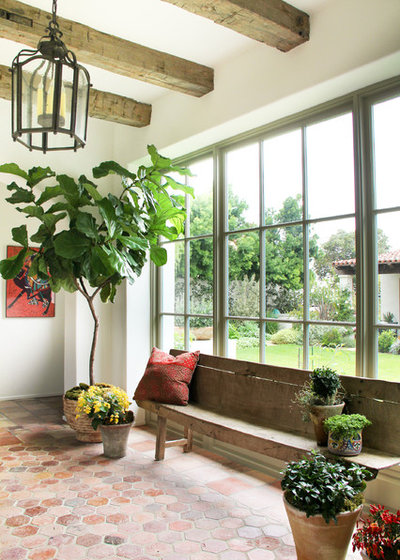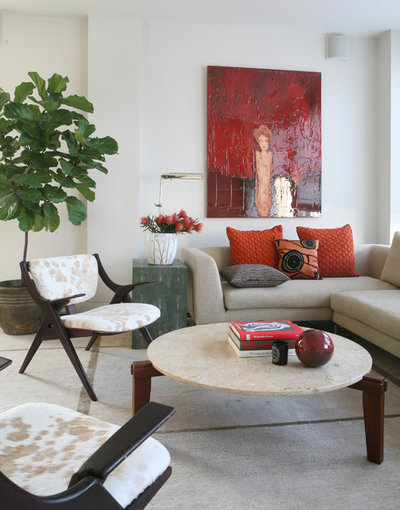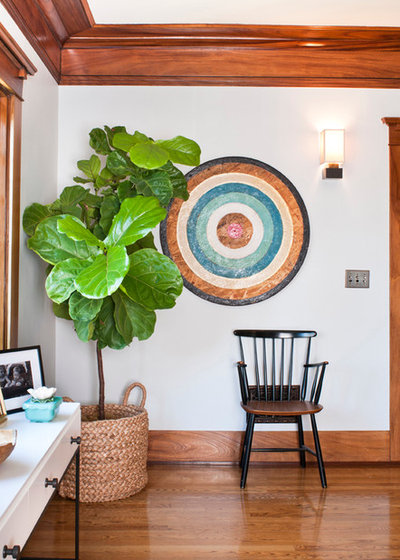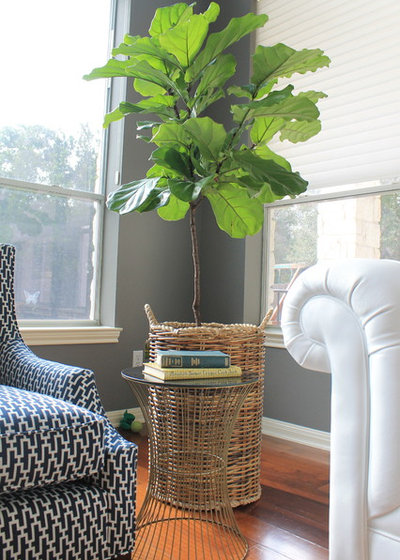The fiddleleaf fig,
Ficus lyrata,
with its
large, dramatic leaves that cluster at the top of narrow trunks, is perfect for filling a corner and providing a welcome shot of green that works with every style. But minimalists might benefit the most. The fiddleleaf fig happens to look most fabulous in spare interiors, where its sculptural fiddle-shaped leaves become almost cartoon-like. Interestingly, while actually tropical in origin,
ficus lyrata looks more like something one might find in a medieval garden or a nicely illustrated children’s book — no beachy decor vibe here.
In addition to all of these great design qualities, fiddleleaf is also known as one of the easiest ficus varieties to care for, and in my research I have yet to come upon any negative comments.

A tall fiddleleaf fig fits perfectly between two armchairs here, creating a park-like vibe. The large scale and slightly retro fabric on the pillows nicely complement the large green leaves.

Chris Barrett Design
The rustic furnishings and architecture in this Palos Verdes, California, home are elegant and spare, providing the perfect setting for a fiddleleaf.

Wettling Architects
The plant even works well with a mostly neutral midcentury modern style in Manhattan.

Jessica Helgerson Interior Design
Artfully paired with ultrawhite decor in this Portland, Oregon, home office, fiddlelleaf fig steals the show. Note that in this case at least three or four young trees were planted in one container for a voluminous effect.

Taylor Jacobson Interior Design
A large-leaved ficus fills a corner in this Los Angeles home, bringing some joy to a space that could have gotten heavy (despite the beauty) on account of the wood floors, doors and lots of molding.

Peter Vincent Architects
This fiddleleaf fig in an open living space in Hawaii adds interest to the vertical space and brings the outdoors in, and the thin tree trunk nicely complements the delicate side-chair frames.

Dana Frieling Interiors
The gray walls in this Austin, Texas, home are a dramatic backdrop for a nice-size fiddleleaf ficus. The tall wicker basket visually balances the top-heavy tree, and it’s likely that the actual pot is propped up within the basket to give the illusion of a taller tree — a great trick to use anytime.
If your style needs something a little less rustic, try using an enameled metal garbage can or a tall ceramic planter. You could fill the lower half of the pot with filler rocks or dirt before adding the plant or tree.

Shaw Coates
If you’re considering adding a fiddleleaf ficus to your home, think about investing in two. A pair of plants that flank the fireplace certainly works well in this Rancho Santa Fe, California, home.
When introducing green plants into a neutral environment, you might want to consider also adding another shade of green (or yellow-green) in a lighter value to ease the contrast between the dark green leaves and the light walls and furnishings. The curtains here do the trick and create a look that’s sophisticated, elegant and welcoming while maintaining a very contemporary feel.
How to care for fiddleleaf fig:- Light: Moderate to bright. The plant needs more light if it appears to be reaching toward the light, has dropping leaves or has new growth that is limited or smaller than older growth. Too much direct sunlight can result in bleaching, browning or discoloration of leaves.
- Temperature: Prefers indoor temperatures between 60 and 85 degrees.
- Water: Water moderately and allow the soil to dry out slightly between waterings. Overwatering can cause root rot. Browning on the edges of the leaves is very likely a sign of overwatering. Drooping or yellow leaves that begin falling are very likely a sign of underwatering. Use room-temperature water, and if you want to be especially careful, use water that has been sitting for at least 24 hours, which allows for chlorine evaporation.
- Soil: General-purpose soil that is rich in organic matter and has good drainage.
- Feeding: Fertilize monthly or as often as every two weeks with a water-soluble fertilizer during the spring and summer, if desired.
Other considerations:- Size: The fiddleleaf fig can grow up to 12 feet high and 6 feet wide; therefore at some point you may need to prune it — though keep your pruning shears packed away, as this is not a fast-growing plant. If you’re looking for a large tree to fill a particular space, it would be wise to invest in a plant that is close to the size you desire.
- Air purification: The larger the leaves, the more toxins they can remove.
- Poison index: This plant can be poisonous if digested, so please keep it away from little ones — another reason to invest in the large tree of your dreams (the leaves will be out of reach).
- Native habitat: Western African tropical jungle environment. The plant grows edible fruit when outdoors in its native habitat.





